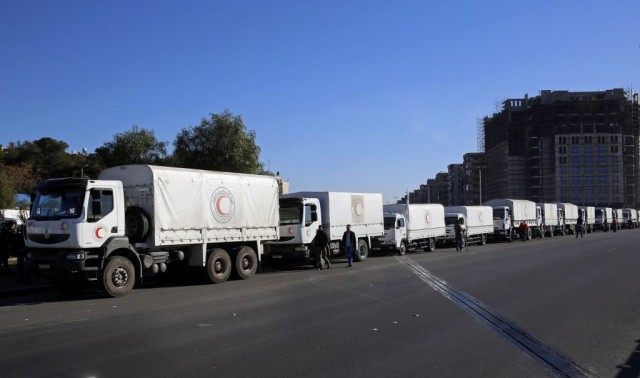DAMASCUS, Syria (AP) — The Latest on the civil war in Syria (all times local):
4:00 p.m.
Turkish President Recep Tayyip Erdogan has criticized the United States for not backing Turkey’s proposals to establish a no-fly zone in Syria.
Erdogan said Wednesday a no-fly would have prevented Russia’s air campaign in the region and thwarted thousands of civilian deaths.
“Oh America! You did not say ‘yes’ to ‘no-fly zone.’ Now the Russian planes are running wild over there, and thousands and tens of thousands of victims are dying,” Erdogan said. “Weren’t we coalition forces? Weren’t we to act together?”
___
3:50 p.m.
Trucks carrying humanitarian assistance destined for besieged areas near Damascus are still parked on a highway on the edge of the capital.
Over 100 trucks carrying food baskets, medicine and milk are expected according to an agreement between the Syrian government and the U.N. to begin entering five besieged areas on Wednesday, including rebel-held suburbs of the Syrian capital. Aid would simultaneously be delivered to communities in the north that are besieged by rebels.
By mid-afternoon, scores of trucks belonging to the Syrian Red Crescent were still parked on the side of the highway at the entrance to Damascus.
An aid official, speaking on condition of anonymity because he was not authorized to give official statements, said the delay was due to “purely logistical” reasons.
— Zeina Karam in Beirut
___
3:10 p.m.
German Chancellor Angela Merkel is renewing her proposal for a no-fly zone in Syria, saying it could be done by an agreement between Syrian President Bashar Assad, his backers and the coalition fighting the Islamic State group.
A German Foreign Ministry spokesman told reporters Wednesday that Merkel’s suggestion came in the context of what was agreed upon in Munich, that a humanitarian corridor should be established to deliver aid to Syrian civilians, and hostilities should cease, hopefully in the next day or two.
Spokesman Martin Schaefer says “If both can be implemented, then that will be the basis to protect the people who are on the Turkish border, maybe 40,000 to 70,000, from attacks from the air and on the ground.”
He gave no further details, however, on how such a no-fly zone would function.
___
2:50 p.m.
Turkey’s president responded angrily to calls for his country to halt its cross-border shelling of Kurdish positions in Syria, saying Ankara “has no such plans.”
Addressing local officials Wednesday, President Recep Tayyip Erdogan also said Turkey would not allow the Syrian Kurdish forces to establish a stronghold at the Syrian-Turkish border.
Turkey regards the Syrian Kurdish forces as a terror group because of their links to its own outlawed Kurdish rebels who are internationally recognized as a terrorist organization.
Turkey has been shelling Kurdish Syrian forces since Saturday, saying it has been responding to provocations. The United States and others have called on Turkey to hold its fire. Erdogan insisted Wednesday that Turkey’s shelling was “self-defense.”
__
2 p.m.
German Chancellor Angela Merkel is renewing her proposal for a no-fly zone in Syria, saying that it could be done by agreement between President Bashar Assad, his backers and the coalition fighting the Islamic State group.
Merkel said that such an agreement would be “a sign of goodwill” and would put many people at ease. She first aired her idea in an interview published Monday, without giving details.
At a news conference Wednesday, Merkel said it would be a good sign if “an agreement between Assad and his supporters and the anti-IS coalition” could produce a commitment to “set up a kind of no-fly zone in which there is no bombing, in which civilians are not pressured and killed” in the area between Aleppo and the Turkish border.
___
1 p.m.
A senior Russian diplomat has shrugged off German Chancellor Angela Merkel’s proposal to consider a no-fly zone over Syria, saying it can only be done with Damascus’ consent.
Deputy Foreign Minister Gennady Gatilov said in remarks carried by the Interfax news agency Wednesday that any no-fly zone would need to be approved by the Syrian government and endorsed by the U.N. Security Council.
Gatilov’s statement comes as Russian warplanes continue to strike militant positions around Aleppo in support of a Syrian army offensive. Russia has said that it will continue to strike extremists in Syria despite a planned truce.
Merkel said in an interview published Monday that it would be “helpful” if there were areas where no side would carry out aerial bombardments — “a kind of no-fly zone.”
___
11:30 a.m.
Trucks destined for besieged areas in Syria are being loaded with humanitarian aid, part of an agreement between the Syrian government and the U.N.’s Syria envoy.
The Syrian foreign ministry hit back Wednesday against envoy Staffan de Mistura, who said the deliveries were a “test” of the Syrian government’s commitment. A statement said “we do not wait for anyone to remind us of our duties toward our people.”
Still, the convoys appeared to be preparing to head to besieged areas Wednesday.
The U.N. said the government of President Bashar Assad had approved access to seven besieged areas across the country and that convoys would head out in the coming days.
The U.N. estimates that 18 Syrian communities are besieged, affecting around half a million people.

COMMENTS
Please let us know if you're having issues with commenting.